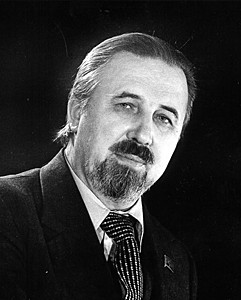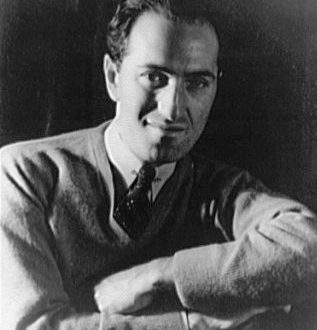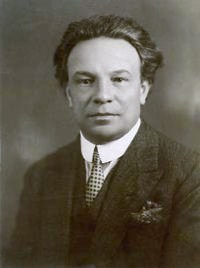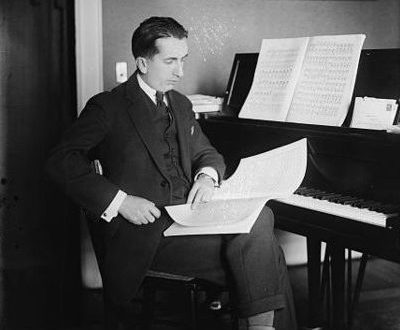
Evgeny Glebov (Eugeny Glebov) |
Eugeny Glebov

Many of the best pages of the musical culture of modern Belarus are connected with the work of E. Glebov, primarily in the symphonic, ballet and cantata-oratorio genres. Undoubtedly, the composer’s attraction to large stage forms (in addition to ballets, he created the opera Your Spring – 1963, the operetta The Parable of the Heirs, or Scandal in the Underworld – 1970, the musical comedy The Millionaire – 1986). Glebov’s path to art was not easy – only at the age of 20 he was able to start professional music lessons, which had always been a cherished dream for a young man. In his family of hereditary railway workers, they always loved to sing. Even in childhood, not knowing the notes, the future composer learned to play the guitar, balalaika and mandolin. In 1947, having entered the Roslavl Railway Technical School according to family tradition, Glebov does not leave his passion – he actively participates in amateur performances, organizes a choir and an instrumental ensemble. In 1948, the first composition of the young author appeared – the song “Student Farewell”. Her success gave Glebov self-confidence.
Having moved to Mogilev, where he works as a wagon inspector, Glebov attends classes at the local music school. The meeting with the famous Belarusian musician I. Zhinovich, who advised me to enter the conservatory, became decisive. In 1950, Glebov’s dream came true, and soon, thanks to his extraordinary perseverance and determination, he became one of the best students in the composition class of Professor A. Bogatyrev. Working a lot and fruitfully, Glebov was forever carried away by Belarusian folklore, which deeply entered his work. The composer constantly writes works for the orchestra of Belarusian folk instruments, for various solo instruments.
Glebov’s activity is multifaceted. Since 1954, he turned to pedagogy, first teaching (until 1963) at the Minsk Musical College, then teaching composition at the conservatory. Work as the head of the variety and symphony orchestra of the State Television and Radio Broadcasting of the BSSR, in the cinema (music editor of Belarusfilm), in the republican theater of the young spectator (conductor and composer) actively influenced creativity. So, the children’s repertoire remains Glebov’s invariable love (songs, the oratorio “Invitation to the Land of Childhood” – 1973, instrumental pieces, etc.). However, despite the variety of hobbies, Glebov is primarily a symphonic composer. Along with program compositions (“Poem-Legend” – 1955; “Polessky Suite” – 1964; “Alpine Symphony-Ballad” – 1967; 3 suites from the ballet “The Chosen One” – 1969; 3 suites from the ballet “Til Ulenspiegel”, 1973- 74; Concerto for orchestra “The Call” – 1988, etc.) Glebov created 5 symphonies, 2 of which are also programmatic (First, “Partisan” – 1958 and Fifth, “To the World” – 1985). The symphonies embodied the most important features of the composer’s artistic personality – the desire to reflect the richness of the surrounding life, the complex spiritual world of the modern generation, the drama of the era. It is no coincidence that one of his best works – the Second Symphony (1963) – was dedicated by the composer to youth.
The composer’s handwriting is characterized by sharpness of expressive means, relief of thematics (often of folklore origin), an accurate sense of form, excellent mastery of the orchestral palette, especially generous in his symphonic scores. The qualities of a playwright-symphonist were refracted in an unusually interesting way in Glebov’s ballets, which took a firm place not only on the domestic stage, but were also staged abroad. The great advantage of the composer’s ballet music is its plasticity, close connection with choreography. The theatrical, spectacular nature of the ballet also determined the special breadth of themes and plots addressed to different eras and countries. At the same time, the genre is interpreted very flexibly, ranging from small characteristic miniatures, a philosophical fairy tale to multi-act musical dramas that tell about the historical fate of the people (“Dream” – 1961; “Belarusian Partisan” – 1965; choreographic novels “Hiroshima”, “Blues”, “ Front”, “Dollar”, “Spanish Dance”, “Musketeers”, “Souvenirs” – 1965; “Alpine Ballad” – 1967; “The Chosen One” – 1969; “Til Ulenspiegel” – 1973; Three miniatures for the Folk Dance Ensemble of the BSSR – 1980; “The Little Prince” – 1981).
Glebov’s art always gravitates toward citizenship. This is clearly manifested in his cantata-oratorio compositions. But the anti-war theme, so close to the artists of Belarus, acquires a special sound in the composer’s work, which sounded with great force in the ballet “Alpine Ballad” (based on the story by V. Bykov), in the Fifth Symphony, in the vocal-symphonic cycle “I Remember” (1964) and in “ Ballad of Memory” (1984), in the Concerto for voice and orchestra (1965).
The composer’s work has received national recognition, true to himself, Evgeny Glebov continues to “actively defend the right to live” with his music.
G. Zhdanova





